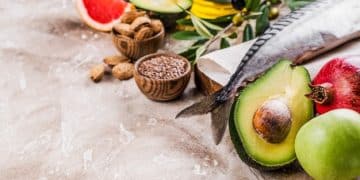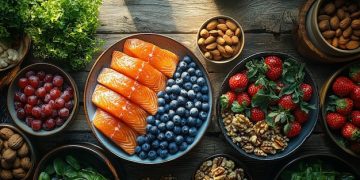Eat Your Way to Better Sleep: Discover 5 Foods for Restful Nights
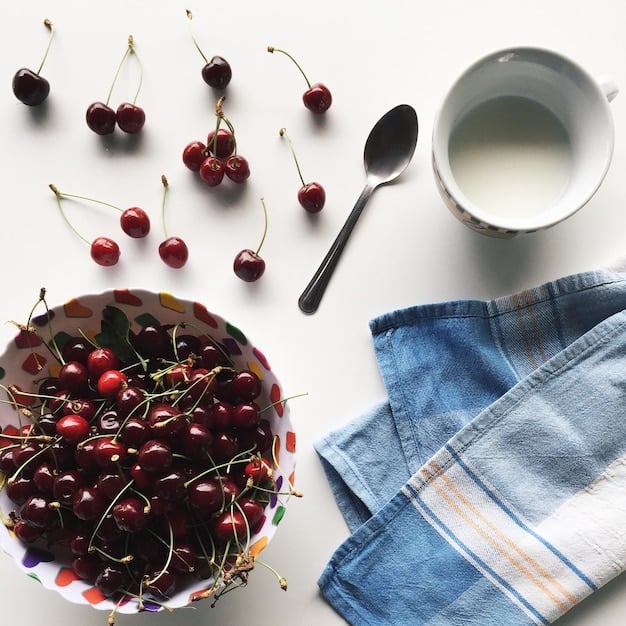
Eat Your Way to Better Sleep: 5 Foods That Promote Restful Nights explores how incorporating specific foods into your diet can significantly improve sleep quality, helping you achieve more restful and rejuvenating nights.
Are you tossing and turning at night, struggling to get a good night’s sleep? Believe it or not, **eat your way to better sleep: 5 foods that promote restful nights** might be the solution you’ve been searching for. What we consume significantly impacts our sleep patterns.
Certain foods contain nutrients and compounds that can naturally promote relaxation and improve sleep quality. Let’s explore how incorporating these foods into your diet could be your ticket to a more peaceful night.
Eat Your Way to Better Sleep: Understanding the Connection
The link between diet and sleep is more profound than many realize. The foods we consume affect our body’s production of sleep-regulating hormones like melatonin and serotonin. Understanding this connection is the first step toward using **eat your way to better sleep: 5 foods that promote restful nights**.
How Food Affects Sleep Quality
Several factors contribute to the way food affects sleep. These include the timing of meals, the types of foods consumed, and individual metabolic responses. Foods rich in tryptophan, magnesium, and potassium can enhance relaxation and prepare the body for sleep.
- Tryptophan: An amino acid that the body converts into serotonin and melatonin, both crucial for sleep.
- Magnesium: A mineral that helps relax muscles and calm the nervous system.
- Potassium: Helps regulate sleep cycles and prevent nighttime awakenings.
Consuming foods high in processed sugars and unhealthy fats can disrupt sleep patterns. These foods can cause blood sugar spikes and crashes, leading to restlessness and difficulty falling asleep. Avoiding these before bed is essential for improved sleep.
Understanding the complexities of the link between diet and sleep empowers individuals to make informed choices that promote **eat your way to better sleep: 5 foods that promote restful nights**, leading to more restful and rejuvenating sleep.
Top 5 Foods to Promote Restful Nights
Now that we understand the connection, let’s dive into the **eat your way to better sleep: 5 foods that promote restful nights** that can help you achieve a more peaceful sleep. These foods are packed with essential nutrients and compounds known to enhance sleep quality.
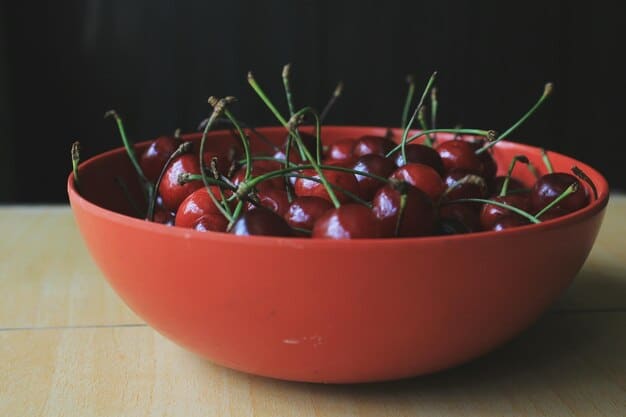
Cherries: A Natural Source of Melatonin
Cherries, particularly tart cherries, are a natural source of melatonin. Melatonin helps regulate the sleep-wake cycle, making it easier to fall asleep and stay asleep. A glass of cherry juice or a handful of cherries before bed can significantly improve sleep.
- Antioxidant Properties: Cherries are also rich in antioxidants, which can reduce inflammation and further support restful sleep.
- Natural Sleep Aid: Unlike sleep medications, cherries offer a natural and gentle way to promote sleep.
- Easy to Incorporate: Add fresh, frozen, or dried cherries to your diet for a tasty and effective sleep aid.
Consuming cherries as part of **eat your way to better sleep: 5 foods that promote restful nights** can be a delicious and effective way to naturally improve your sleep patterns.
Almonds: Magnesium-Rich Sleep Enhancers
Almonds are a great source of magnesium, a mineral that helps relax muscles and nerves, promoting a sense of calm that can improve sleep. Regular consumption of almonds can contribute to better sleep quality and overall well-being as you **eat your way to better sleep: 5 foods that promote restful nights**.
Benefits of Magnesium for Sleep
Magnesium plays a crucial role in regulating neurotransmitters, which are essential for sleep. A deficiency in magnesium can lead to insomnia and other sleep disorders. Incorporating almonds into your diet can help ensure you get enough of this vital mineral.
Including almonds in your daily diet not only aids sleep but also provides essential nutrients that support overall health. This makes almonds a valuable addition to any dietary plan focused on physical well-being.
How to Include Almonds in Your Diet
Almonds can be enjoyed in various ways. They can be eaten as a snack, sprinkled on salads, or added to yogurt or oatmeal. Almond butter is another great option that can be spread on whole-grain toast or added to smoothies.
In conclusion, embracing almonds as part of **eat your way to better sleep: 5 foods that promote restful nights** is a simple yet impactful way to naturally boost your sleep quality.
Kiwi: Antioxidant-Packed Sleep Improver
Kiwi is another excellent food choice that can help you **eat your way to better sleep: 5 foods that promote restful nights**. Rich in antioxidants and vitamin C, kiwi has been shown to improve sleep onset, duration, and efficiency.
Why Kiwi Helps You Sleep
The high antioxidant content in kiwi helps fight inflammation, which can disrupt sleep patterns. Additionally, kiwi contains serotonin, a hormone that promotes relaxation and regulates sleep.
The synergistic effect of kiwi’s nutrients makes it a potent sleep aid. Its natural compounds work together to calm the body and prepare it for a restful night, contributing to improved sleep.
How to Enjoy Kiwi Before Bed
Eating one or two kiwis an hour before bed can significantly improve sleep quality. You can eat them whole, add them to a smoothie, or include them in a light snack. Experiment to find the best way for you to enjoy this sleep-promoting fruit.
By choosing kiwi as part of **eat your way to better sleep: 5 foods that promote restful nights**, you’re choosing a delicious, nutritious, and effective strategy for enhancing your sleep naturally.
Walnuts: Offering a Natural Source of Melatonin
Walnuts are a great addition to your nighttime routine, helping you **eat your way to better sleep: 5 foods that promote restful nights** given they provide a natural source of melatonin, the key hormone that regulates sleep.
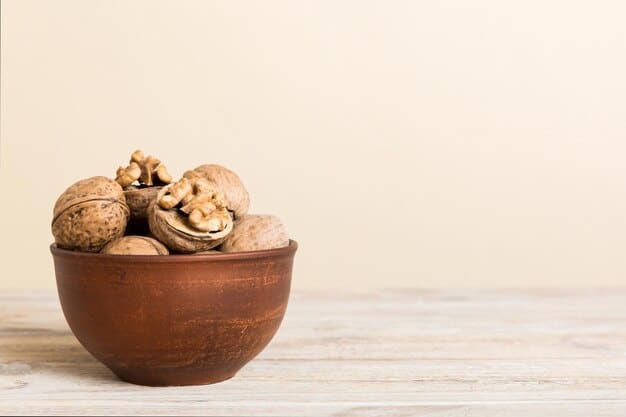
The Role of Walnuts in Promoting Sleep
These nuts not only contain melatonin but are also rich in other sleep-promoting nutrients like magnesium and tryptophan. Incorporating walnuts into your evening snack routine can help you fall asleep faster and enjoy a more restful night.
- Versatile Snack: Walnuts can be enjoyed on their own, mixed into yogurt, or added to salads.
- Healthy Fats: They also contain healthy fats that contribute to overall well-being, making them a smart choice for a nighttime snack.
- Easy Inclusion: They are convenient to keep on hand and easy to integrate into your daily diet.
Choosing walnuts as part of **eat your way to better sleep: 5 foods that promote restful nights** brings a unique set of benefits, including valuable nutrients that support healthy sleep patterns.
Warm Milk: A Classic Sleep Remedy
Warm milk is a classic remedy that can help you **eat your way to better sleep: 5 foods that promote restful nights**. The combination of warmth and the presence of tryptophan makes it a soothing and effective sleep aid.
Why Warm Milk Works
The warmth of the milk has a calming effect, while the tryptophan helps boost serotonin and melatonin levels. This combination helps relax the body and prepare it for sleep. You can even make it a part of **eat your way to better sleep: 5 foods that promote restful nights**.
- Psychological Comfort: Warm milk can also evoke feelings of comfort and relaxation, making it easier to unwind before bed.
- Calcium Benefits: Additionally, milk provides calcium, which can help regulate sleep cycles and promote better sleep.
- Simple Preparation: It is also easy to prepare and can be flavored with a touch of honey or cinnamon for added benefit.
By incorporating warm milk into your nighttime routine, you are leveraging a tried-and-true method that combines physical and psychological benefits to promote restful nights.
| Key Point | Brief Description |
|---|---|
| 🍒 Cherries | Natural melatonin source promotes better sleep. |
| 🌰 Almonds | Magnesium-rich snack relaxes muscles for restful sleep. |
| 🥝 Kiwi | Antioxidants and serotonin improve sleep onset and duration. |
| 🥛 Warm Milk | Classic remedy; tryptophan calms and improves sleep. |
Frequently Asked Questions
Incorporating foods like cherries, almonds, kiwis, walnuts, and warm milk into your diet, especially before bed, can help improve sleep duration and quality. These foods contain nutrients that regulate sleep hormones like melatonin and serotonin.
Yes, it’s best to avoid foods high in processed sugars, unhealthy fats, and caffeine before bed. These can disrupt sleep patterns and make it harder to fall and stay asleep throughout the night.
Ideally, consuming sleep-promoting foods about one to two hours before bed allows your body to digest and utilize the nutrients effectively. This timing helps facilitate the production of sleep-regulating hormones, enhancing relaxation.
Yes, the consumption of specific foods can significantly influence sleep quality. Nutrients like tryptophan, magnesium, and melatonin, found in foods like almonds and cherries, directly affect sleep regulating hormones and relaxation.
Yes, regularly incorporating these foods is generally safe and beneficial, as they provide essential nutrients. However, it is always best to consult with a healthcare provider or nutritionist for personalized dietary advice, especially if you have underlying health concerns.
Conclusion
Incorporating these **eat your way to better sleep: 5 foods that promote restful nights** offers a natural and effective way to improve sleep quality. By understanding the power of nutrition, you can optimize your diet to support more restful sleep.


